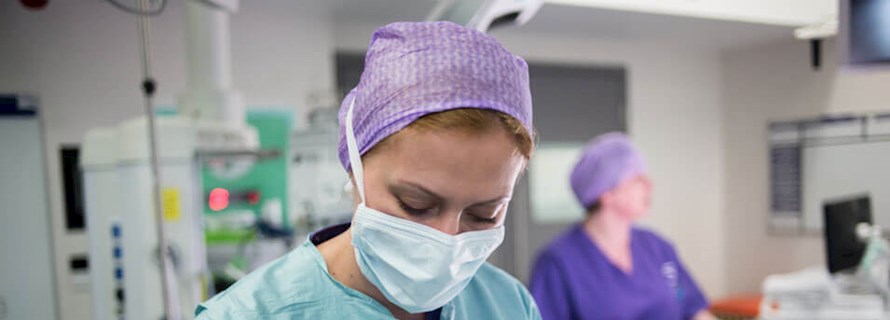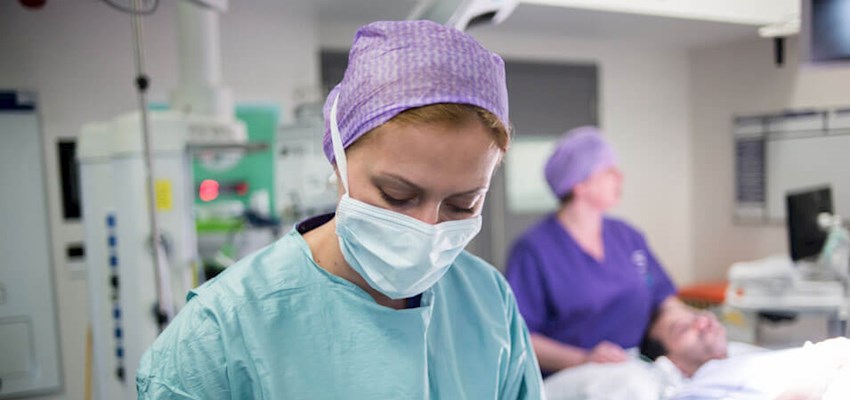Anterior Cruciate Ligament (ACL) Reconstruction
Surgery to repair your Anterior Cruciate Ligament (ACL)
The anterior cruciate ligament (ACL) is a major ligament in the knee. Sometimes, sudden stops or changes in direction, for example during sports or vigorous exercise, can lead to a tear. ACL reconstruction is a procedure to repair the torn ligament and restore stability in your knee.
What does your anterior cruciate ligament do?
The anterior cruciate ligament is one of the four main ligaments in your knee, and serves three important functions:
- It gives your knee twisting stability. This is especially useful in sports such as football, rugby and skiing.
- It protects other structures in the knee from future damage, such as the meniscus cartilage.
- It slows down the possible future onset of arthritis
Why do I need ACL reconstruction surgery?
If you have an ACL injury that has left your knee unstable and giving way, you may be eligible for reconstructive surgery. Reconstructive surgery is vital for some patients to retain and improve the use of their knee. In some cases, where ACL damage is left untreated, it can lead to long-term injury and further degeneration of the knee.
There are various reasons you might consider ACL reconstruction as an option, including:
- If you have a very active lifestyle, or play a lot of sports – either as a hobby or professionally.
- If you have a job that requires a lot of physical or manual activity.
- If you have damage to other areas of your knee or knees that would benefit from repair by ACL reconstruction.
Generally, if you’re an active patient who relies on consistent use of your knees in your day-to-day life, ACL reconstruction can help you get back your full range of use and prevent long-term, lasting damage.
Benefits of ACL reconstruction surgery
ACL reconstruction surgery has many benefits to consider. It can:
- Relieve pain
- Help to stabilize your damaged knee, reducing the risk of further injury
- Allow you to return to your usual level of physical activity or sports.
ACL reconstruction should return your knee to full, or almost full, mobility and has a very high long-term success rate, reducing the likelihood of future complications.
Need to know
-
What are the treatment options for ACL tears? icon plus
First, your consultant will offer you a thorough assessment. This will include questions, a physical examination and an MRI scan. Following this, they will be able to discuss the options available to you, including non-surgical treatment as well as a surgical reconstruction.
If you wish to consider surgery, your consultant will discuss the following with you:
- The type of graft tissue to be used (either your own or from a donor)
- The potential risks of surgery, including the risk of failure
- The planned benefits of your surgery
- Your rehabilitation programme
- Success rates, and timing of return to sport
-
Is ACL reconstruction major surgery? icon plus
While ACL surgery is very common, it’s considered major surgery. The procedure is invasive and typically carried out under general anesthetic.
Recovery times for this type of surgery can be fairly long and, despite the very high success rate, the surgery comes with the risk of complications, just as any other surgery would.
-
What happens if you don’t repair a torn ACL? icon plus
If an ACL tear is left untreated, it can develop into a chronic ACL deficiency. This can lead to serious consequences in the future, such as increasing weakness in the joint.
A 2017 study showed that those with ACL tears that are left untreated increase the risk of further damaging the knee by 1% for every month left between injuring or tearing your ACL and getting surgery to repair it.
-
Can your ACL heal naturally? icon plus
If you’ve suffered very minor tears (sprains) to your ACL, these may be able to heal without surgery. However, in most cases, there won’t be any blood supply to the damaged ligament, meaning your ACL won’t be able heal on its own.
-
How painful is ACL surgery? icon plus
During the surgery itself, you’ll typically be under a general anesthetic (as advised by your consultant), and so won't experience any pain. This will also ensure that the muscles surrounding the joint are relaxed enough to conduct the procedure.
Towards the end of the operation, a local anesthetic may be used around the knee and joint area to help limit the pain.
As with all surgical procedures, there may be some pain following the procedure. However, this can be managed with most standard pain-relief medication.
-
How to prepare for ACL surgery icon plus
Before having the surgery, you may need to wait for any swelling to go down and to regain a full range of movement in your knee as this will make recovering from surgery easier. If your knee is still sore and stiff, pre-surgery physiotherapy will be required to prepare your knee for your operation. As part of our ongoing commitment to the gold standard requirement for pre-operative physiotherapy, your consultant may also advise you to wait until the muscles at the front and back of your thigh are as strong as possible.
-
ACL surgery recovery icon plus
Full recovery from ACL surgery can take anywhere from six months to a year.
In the first few days after surgery, you’ll see a physiotherapist, who will give you a rehabilitation plan to follow. This fully personalized plan will consist of exercises that have been chosen specifically for you and your recovery, depending on the extent of the damage your knee has suffered and the level of physical activity you’re looking to return to.
At two weeks after surgery, most patients can get around on crutches, after six months, they can return to playing sports. However, it’s important to remember that recovery rates vary from person to person.
Don't wait, pay for yourself
Our ACL consultants
We’re proud to work with leading orthopedic knee specialists, whose skills are matched by their integrity and compassion.
Supporting our consultants are teams of inpatient and outpatient physiotherapists with experience in knee recovery.




Our locations in London
From complex orthopedic surgery to straightforward diagnostic scans and minor procedures, we provide exceptional care across our network of hospitals, outpatient centers and specialist clinics.
Private ACL treatment in Birmingham
Request a knee appointment
We're happy to help you make an appointment with one of our experienced knee consultants. We can also make imaging and outpatient physiotherapy appointments for you.
Call us today
020 7079 4344